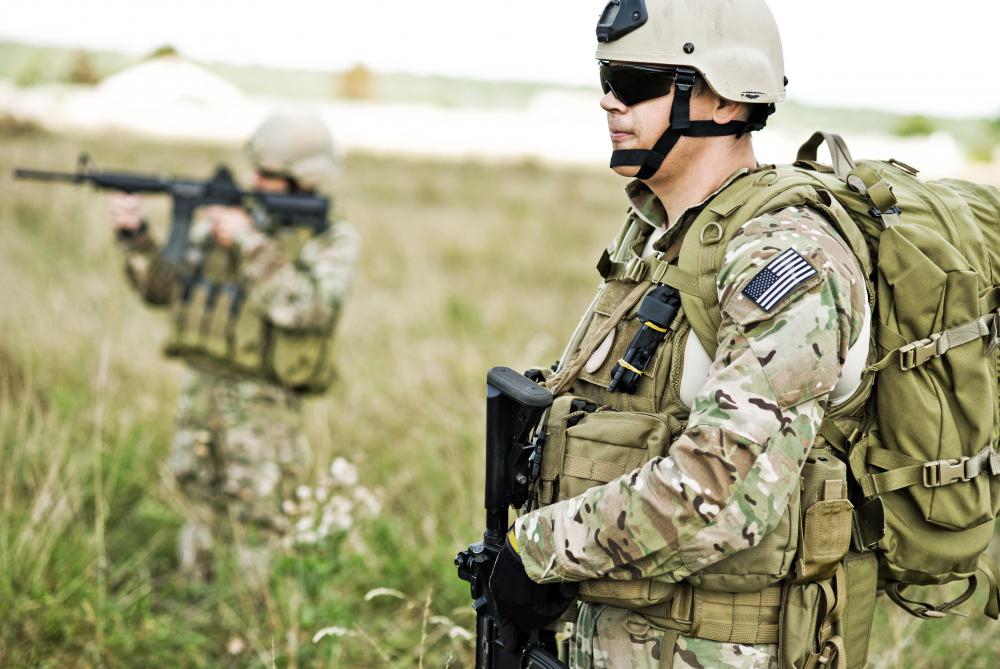At WiseGEEK, we're committed to delivering accurate, trustworthy information. Our expert-authored content is rigorously fact-checked and sourced from credible authorities. Discover how we uphold the highest standards in providing you with reliable knowledge.
What is a Judge Advocate?
A judge advocate is a military lawyer &emdash; that is, an officer with special military legal training &emdash; who serves as legal adviser to the command to which he or she is attached. In this role, a judge advocate may also act as the unit commander's personal legal adviser. In the United States, each branch of the service &emdash; the Army, Navy, Air Force, Marines and Coast Guard &emdash; has its own Judge Advocate General, or “JAG” &emdash; the chief legal officer of that service. In the Army, Air Force and Navy, the JAG commands the JAG Corps. The Marines' JAG Department is subordinate to the Navy JAG Corps, and the Coast Guard maintains an Office of the Judge Advocate General. Each branch's JAG serves as chief counsel to the branch's chief of staff and may also advise the department's secretary.
A judge advocate generally has already graduated law school when he accepts an officer's commission in the armed forces. After commissioning, the new JAG officer takes a special course of training in military law, especially the Uniform Code of Military Justice (UCMJ), the United States' system of military law applicable to all branches of the service. Upon completion of the course, the new JAG officer will be assigned to a command.

Judge advocates perform a wide variety of legal duties for the command to which they're assigned, including such routine matters such as helping enlisted personnel deal with military and civilian legal matters and ensuring that all members of the unit have up-to-date wills on file. The prosecuting and defending attorneys in courts-martial are both judge advocates, and experienced JAG officers may be appointed to preside over such trials. The modern judge advocate, though, fulfills a number of other functions, often practicing civilian and military labor law, as well as international, environmental, tort, contract and administrative law.

As the 20th century drew to a close, the role of judge advocate became significantly more important to the military's accomplishment of its mission. During the Vietnam War, for example, the Air Force consulted only a single judge advocate for operations law advice. Judge advocates were involved in every phase of strategic planning for the 1991 Gulf War, and over 250 were stationed in Saudi Arabia during that war. Judge advocates were also essential to the planning and execution of the the 2001 invasion of Afghanistan and the subsequent invasion of Iraq. Judge advocates have been especially critical in developing the rules of engagement &emdash; that is, the circumstances under which the military may use force &emdash; and in training troops in those rules. Judge advocates' input is especially critical in target planning &emdash; that is, determining those targets that actually have military value to the enemy and the extent to which the loss of civilian life or property, or “collateral damage,” is acceptable.
AS FEATURED ON:
AS FEATURED ON:












Discussion Comments
The last paragraph is an eye opener as it really demonstrates a shift in U.S. military operations. There are a lot more rules and regulations -- laws, really -- that govern combat. Those rules must be followed and JAG lawyers are there to advice the military on how to conduct themselves within the confines of those laws.
Some have argued that the laws governing military conduct in combat zones has been so restrictive that they get in the way of the objectives of the armed forces, namely winning wars by the most expedient means possible. Others have argued that the increased laws are there to make sure our armed forces conduct themselves in such a manner that human rights are respected and atrocities are prevented.
The question central to such debates is a simple one -- how much control should the government have over the armed forces? Is it appropriate for Washington to get heavily involved in military policy or is that best left to the military itself? The debate continues...
For a lot of attorneys, becoming a judge advocate is a great career choice. Although a number of attorneys wind up joining the military and becoming officers after graduating law school, more than a few became officers prior to attending law school.
For those future JAG lawyers, they have one assignment -- go to law school and graduate. The military picks up their tuition, provides them a place to live, still pays them a salary, etc. After they graduate from law school, they are typically assigned to a base where they start careers as JAG lawyers.
Here's the thing -- while a lot of law students are wondering what they will do after school, those military officers destined to be JAG officers know exactly what they will do and can look forward to solid salaries. There is comfort in that.
Post your comments